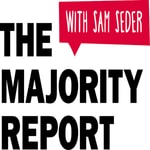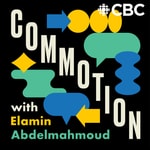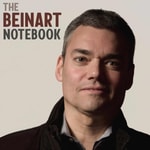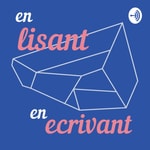BULAQ | بولاق – Détails, épisodes et analyse
Détails du podcast
Informations techniques et générales issues du flux RSS du podcast.
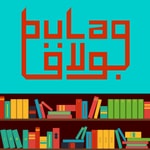
BULAQ | بولاق
Ursula Lindsey and M Lynx Qualey
Fréquence : 1 épisode/19j. Total Éps: 143

Hosted on Acast. See acast.com/privacy for more information.
Classements récents
Dernières positions dans les classements Apple Podcasts et Spotify.
Apple Podcasts
🇬🇧 Grande Bretagne - books
14/04/2025#87🇩🇪 Allemagne - books
10/04/2025#72🇫🇷 France - books
06/12/2024#100🇨🇦 Canada - books
01/12/2024#92🇩🇪 Allemagne - books
06/11/2024#83
Spotify
Aucun classement récent disponible
Liens partagés entre épisodes et podcasts
Liens présents dans les descriptions d'épisodes et autres podcasts les utilisant également.
See all- https://donorbox.org/support-bulaq
12 partages
- http://www.mstdfr.com/
12 partages
- https://twitter.com/VersoBooks
2 partages
- https://twitter.com/KarlreMarks
2 partages
Qualité et score du flux RSS
Évaluation technique de la qualité et de la structure du flux RSS.
See allScore global : 89%
Historique des publications
Répartition mensuelle des publications d'épisodes au fil des années.
Flash Fiction Winner Karima Ahdad
Saison 6 · Épisode 107
jeudi 17 octobre 2024 • Durée 47:07
Moroccan author Karima Ahdad was the winner of this year’s Arabic Flash Fiction contest run by ArabLit and Komet Kashakeel, which saw more than 900 entries from around the world. We read her award-winning story in Katherine Van de Vate’s discussion and discuss patriarchy, story creation, and what it means to write “feminist” work.
Show Notes:
Karima was also shortlisted for an earlier edition of the ArabLit Story Prize. You can read her shortlisted story, “The Baffling Case of the Man Called Ahmet Yilmaz,” in Katherine Van de Vate’s translation.
Katherine also translated an excerpt of Karima’s The Cactus Girls for The Markaz Review.
You can read a conversation between Karima and Katherine about Cactus Girls on arablit.
You can find more about all Karima’s books at her website, karimaahdad.com.
On the topic of the “political” novel, we mentioned Rabih Alameddine’s new book, Comforting Myths.
The Arabic Flash Fiction prize is funded by the British Council’s Beyond Literature Borders programme corun by Speaking Volumes Live Literature Productions. Find all the finalists at ArabLit.
Hosted on Acast. See acast.com/privacy for more information.
Reem Bassiouney: Writing Historical Fiction is like “Stringing Pearls”
Saison 6 · Épisode 106
jeudi 3 octobre 2024 • Durée 42:08
An epic historical novel set in Fatimid Cairo, Reem Bassiouney’s The Halva-Maker trilogy won the Sheikh Zayed Book Award and is forthcoming in English. The book explores the founding of Cairo, by a Shia dynasty and a set of generals and rulers who all hailed from elsewhere. We talked to Bassiouney about balancing research and imagination; shining a light on women in Egyptian medieval history; and the heritage (architectural and culinary) of the past.
This episode of the BULAQ podcast is produced in collaboration with the Sheikh Zayed Book Award.The Sheikh Zayed Book Award is one of the Arab world’s most prestigious literary prizes, showcasing the stimulating and ambitious work of writers, translators, researchers, academics and publishers advancing Arab literature and culture around the globe. The Sheikh Zayed Book Award Translation Grant is open all year round, with funding available for fiction titles that have won or been shortlisted for the award. Publishers outside the Arab world are eligible to apply. Find out more on the Sheikh Zayed Book Award website at: zayedaward.ae
Bassiouney is a professor of socio-linguistics at the American University in Cairo. She has won the State Award for Excellence in Literature for her overall literary works, the Naguib Mahfouz Medal for Literature from the Supreme Council for Culture for her Sons of the People: The Mamluk Trilogy (trans. Roger Allen), the Sawiris Cultural Award for her novel Professor Hanaa (trans. Laila Helmy), and a Best Translated Book Award for The Pistachio Seller (trans. Osman Nusairi).
Dar Arab will publish Bassiouney’s The Halva-Maker trilogy and her novel Mario and Abu l-Abbas. Both have been translated by Roger Allen.
Bassiouney’s Ibn Tulun Trilogy, also translated by Roger, was published by Georgetown University Press.
Hosted on Acast. See acast.com/privacy for more information.
Inside The World of Lebanese Comics with Rawand Issa
Saison 5 · Épisode 98
jeudi 15 juin 2023 • Durée 01:00:31
Comics artist Rawand Issa joins us to talk about her book Inside the Giant Fish (trans. Amy Chiniara, Maamoul Press); her path from journalism to graphic art; artist groups and collectives across the region; the “new school of Arab comics,” and the challenges of making a living as a comics artist. We also talk about a few other Lebanese graphic novels, particularly Lamia Ziadé’s My Port of Beirut, translated to English by Emma Ramadan, and Lena Merhej’s I Think We’ll Be Calmer in the Next War.
Show Notes:
You can find several of Rawand’s books available from Maamoul Press: http://maamoulpress.com.
Also read Rawand’s “Being Illegal is Unbearable at The Nib, her ماذا نفعل في مواجهة استمرار العنف ضد النساء؟ at Jeem and her untitled work in Chime.
And if you missed it, there’s a discussion with Rawand and translator Amy Chiniara about Inside the Giant Fish at ArabLit.
Samandal magazine is on Instagram (@samandalcomics), and you can find them at samandal-comics.org.
You can buy copies of the magazine Corniche at the Sharjah Art Foundation website.
Lab619 (@lab619), Skefkef (@skefkefmag/), and Fanzeen Comics (@fanzeencomics/) are on Instagram, while TokTok has a website, toktokmag.com.
Rawand Issa (@rawand.issa_) and Amy Chiniara (@amychiniara) are both on Instagram, too.
Lamia Ziadé’s My Port of Beirut, translated to English by Emma Ramadan, from Pluto Press
Lena Merhej’s We Will Be Calmer in the Next War is available online.
Please support BULAQ! You can donate to our fundraiser for the 2023 season at donorbox.org/support-bulaq.
Hosted on Acast. See acast.com/privacy for more information.
Disappearing Palestinians
Saison 1 · Épisode 37
mercredi 23 octobre 2019 • Durée 54:08
We talk about two festivals (one long-established, one brand new) that celebrate Palestinian literature; an author who was penalized for supporting BDS; and a book that asks the question: What would happen if Palestinians simply disappeared? (And once again we recorded this episode in the studio of the wonderful Sowt platform in Amman).
Show NotesJayne Cortez’s poem “There It Is” was performed by Sapphire at Palfest 2014.
Palfest was re-launched this year with a focus on knowledge production and an emphasis on how Palestine fits within larger struggles against imperialism, racism and economic exploitation.
The first-of-its kind literary festival Palestine Writes will be held in New York in March 2020.
Kamila Shamsie was de-awarded the Nellie Sachs literary prize over her support of the Palestinian BDS (Boycott Divestment and Sanctions) movement. Hundreds of writers signed a statement of solidarity with her.
Benjamin Netanyahu promised further annexations in the West Bank during his last electoral campaign. The details of the Trump administration’s “deal of the century” have yet to emerge.
As the New York Times reported recently, Israel bans Arabic-language books from entering the country.
Ibtisem Azem’s The Book of Disappearance was translated from the Arabic by Sinan Antoon.
Hosted on Acast. See acast.com/privacy for more information.
Out of Egypt
Saison 1 · Épisode 36
mercredi 9 octobre 2019 • Durée 50:46
Ursula & MLQ open the new season of BULAQ -- recorded in Amman, under the auspices of the Sowt network -- with a focus on Egypt.
This episode's reading is from Yasmine Zohdi's translation of Muhammad al-Haj's Sawiris-winning Nobody Mourns the City's Cats, available in the Summer 2019 issue of ArabLit Quarterly.
Azzurra Meringolo Scarfoglio’s book of interviews with Egyptian exiles is Fuga dall’Egitto (“Escape from Egypt”).
Ursula reviewed Peter Hessler’s The Buried: An Archaeology of the Egyptian Revolution, in the New York Review of Books.
More than 2,000 Egyptians have been detained in a massive sweep of arrests following a new series of protests across the country; among the detainees is Egyptian novelist Muhammad Aladdin, whose charming revolution story, "Season of Migration to Arkadia," is available in Humphrey Davies' translation.
Marcia guest-edited the last issue of Words Without Border, focused on Arabic humor.
Hosted on Acast. See acast.com/privacy for more information.
Trash Talk
Saison 1 · Épisode 35
samedi 20 juillet 2019 • Durée 01:04:47
In our last episode before half our team moves and we take a summer break, we discuss a brilliant essay on the downsides of being a professional translator; the Shubbak literary festival; and our plans for the future.
Show NotesWe read from Lina Mounzer’s ”Trash Talk: On Translating Garbage,” which recently appeared on the Paris Review and struck a nerve among translators, editors, and various other word-jobbers. You can also another essay of Mounzer’s on life as a translator: “War in Translation: Giving Voice to the Women of Syria.”
The literary strand of the Shubbak Festival took place at the end of last June in London; there was some discussion online of the first panel on feminism. You can also get panelist and graphic novelist Deena Mohamed’s Shubeik Lubeik online.
During our summer hiatus, please take share Bulaq with a friend. Also, if you are so inclined, share your feedback with us on our Twitter handle @bulaqbooks: What was your favorite episode? What would you like to hear more of? Are there particular topics, essays, or books that you think would make for an interesting discussion on Bulaq? What else, if anything, would you like to tell us?
Hosted on Acast. See acast.com/privacy for more information.
Invisibility
Saison 1 · Épisode 34
dimanche 23 juin 2019 • Durée 01:16:00
We have novelist Ruqaya Izziddien as our guest in this episode, to discuss her debut novel The Watermelon Boys, her blog Muslim Impossible and the need for more narratives in English that accurately represent Arab voices and history. We also talk about George Orwell’s 1939 essay “Marrakech.”
Show NotesOur guest this episode was Ruqaya Izzidien, author of The Watermelon Boys, which was shortlisted for this year’s Betty Trask Prize. Ruqaya will also be appearing June 30 at the Shubbak Festival in London, on a panel with Inaam Kachachi and Rabai al-Madhoun, and possibly Hammour Ziada.
Hanna Diyab is acknowledged -- in Antoine Galland's diary and is Diyab's own writings -- as the author of the "Aladdin" story commonly bundled in with the 1001 Nights. A French translation of Diyab’s travel narrative, D’Alep à Paris: Les pérégrinations d’un jeune syrien au temps de Louis XIV, appeared in 2015, edited and translated by Paule Fahmé-Thiéry, Bernard Heyberger, and Jérôme Lentin. An English translation, by Elias Muhanna and Johannes Stephan, is tentatively scheduled for Fall 2020.
Dr. Debbie Reese and Dr. Jean Mendoza are the forces behind the invaluable American Indians in Children's Literature.
You can read a transcript of the film Reel Bad Arabs, based on the classic book by Jack Shaheen.
The Dzanc Books statement about Hesh Kestin's The Siege of Tel Aviv is available on the publisher's website.
Izzidien is also the editor behind Muslim Impossible, a new website that “reviews fictional Muslim and Arab characters in film, TV and literature that are unbelievable, poorly-researched or prejudiced.”
We disagreed about whether George Orwell’s “Marrakech” essay falls in that category. Here is a video and translation of part of the essay into Darija by a Moroccan YouTuber.
Hosted on Acast. See acast.com/privacy for more information.
Our Women on the Ground
Saison 1 · Épisode 33
lundi 10 juin 2019 • Durée 49:32
We spend most of today’s episode talking about a forthcoming collection of essays by female journalists from the region. Guilt, anger, recklessness, determination. There are many different and movingly honest takes on reporting while Arab and female.
SHOW NOTESOmani novelist Jokha al-Harthi and translator Marilyn Hacker won the 2019 Man Booker International with Celestial Bodies (Sayyidat al-Qamr). We talked about the book on Episode 29 and MLQ spoke to al-Harthi and Booth the morning after their win, and an edited Q&A was published on Qantara. Also: more on the Omani writers al-Harthi recommends you read.
Ursula’s piece about Sa’adallah Wannous, “Coup de Théâtre,” is in the NYRB. The great playwright’s daughter, Dima Wannous, is also an acclaimed novelist and will be appearing at this year’s Shubbak Festival. Her novel The Frightened is expected in 2020 in Elisabeth Jaquette’s English translation.
Our Women on the Ground: Essays by Arab Women Reporting from the Arab World, ed. Zahra Hankir, will be published August 6, 2019, when an audiobook version, read by Soneela Nankani, will also be available. Among the many brilliant contributors is Lina Attallah, who both MLQ and Ursula have worked with variously at Al-Masry al-Youm, the Egypt Independent, and her current iconic, fearless, and relentlessly experimental project, Mada Masr.
Hosted on Acast. See acast.com/privacy for more information.
Work-lit Balance
Saison 1 · Épisode 32
dimanche 19 mai 2019 • Durée 01:04:44
This week we talk about how MLQ’s latest passion project, the Arab Lit Quarterly, and the ups and downs of making a living (sort of) writing about books.
Hosted on Acast. See acast.com/privacy for more information.
This Takes the Prize
Saison 1 · Épisode 31
lundi 6 mai 2019 • Durée 58:24
MLQ is back from Abu Dhabi, and we talk about the recently awarded International Prize for Arabic Fiction — and an unfortunate controversy this year, involving leaks, no-shows, and calls for prosecution — and the book fair. We also share excerpts from the winning book and from several of the short-listed ones.
Show NotesThe International Prize for Arabic Fiction announced the prize’s 2019 winner, Hoda Barakat’s The Night Post, on April 23. The name of the winner, and a few apparent details about the judging process, was leaked by former IPAF judge Abdo Wazen in Independent Arabia a few hours before the official announcement.
The prize’s official statement about the leak can be found on their website. Also notable are Arab Writers Union head Habib al-Sayegh’s comments about the leak, Hoda Barakat’s acceptance speech, and shortlisted writer Kafa Al-Zou’bi’s social-media habits.
Hosted on Acast. See acast.com/privacy for more information.




